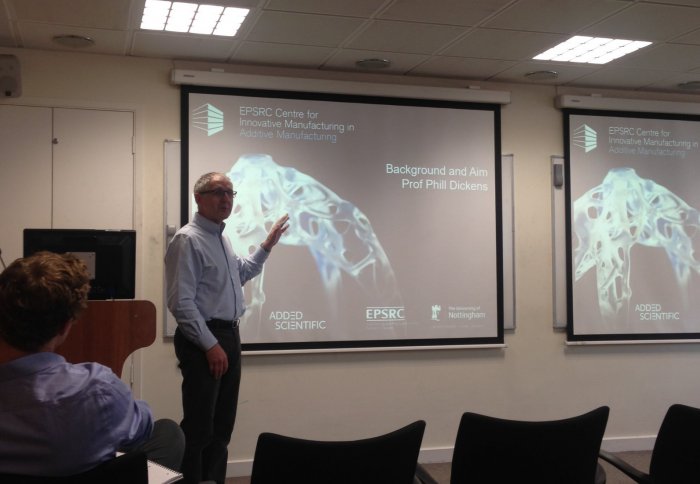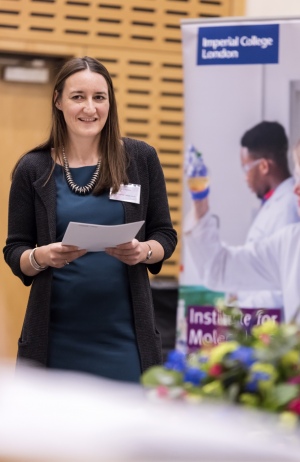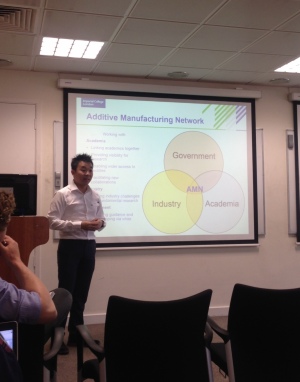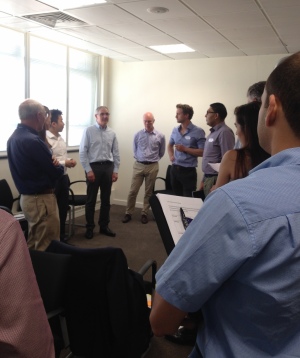The future of additive manufacturing

Professor Phill Dickens, University of Nottingham
More than 30 researchers from across Imperial's faculties and departments came together last week to discuss the future of the 3D printing industry.
There are vast opportunities for innovation in additive manufacturing – from novel processes and applications, to design methodologies and IP protection.
– Dr Connor Myant
Dyson School of Design Engineering
The half-day event on Imperial’s South Kensington Campus was the latest bespoke workshop organised by the Institute for Molecular Science and Engineering (IMSE). Held in conjunction with Imperial’s Additive Manufacturing Network, the workshop was led by Professor Phill Dickens, EPSRC Foresight Fellow in Manufacturing at the University of Nottingham’s EPSRC Centre for Innovative Manufacturing in Additive Manufacturing.
Fast growing market

IMSE Co-Director Professor Claire Adjiman
The rapidly growing additive manufacturing (or 3D printing) industry was valued at $3.07 billion in 2013 and is predicted to grow to $21 billion by 2020. This growth has arisen due to the adoption of 3D printing activities in a variety of key sectors, including aerospace, medical devices, automotive and creative industries. To help ensure that the UK continues to compete in this valuable market, Professor Dickens and a larger steering group will launch the UK Strategy for Additive Manufacturing on 22nd June.
The main aim of the IMSE workshop was to provide Imperial academics with an overview of the current additive manufacturing space and the ongoing research challenges in this area. In keeping with IMSE’s collaborative ethos, the morning also featured an interactive brainstorming session to discuss concepts for future research projects.
3D printing transformation
Following a welcome to the meeting by IMSE Co-Director Professor Claire Adjiman, Professor Dickens presented a primer on current additive manufacturing techniques, including their associated advantages and problems. Despite the growing popularity of additive manufacturing, explained Professor Dickens, the industry has witnessed only gradual improvements over the past two decades.
We need new ‘mad hatter’ ideas to completely transform 3D printing processes.
– Professor Phill Dickens
University of Nottingham
For example, although the speed of 3D printing has increased slightly since the 1990s, a further increase in production rates – of at least two orders of magnitude – is still required for high-value industrial manufacturing applications. Such an improvement, however, is unlikely to be achieved with current state-of-the-art 3D printing processes, and completely new ideas will need to be developed.
Additive manufacturing at Imperial

Dr Billy Wu
Imperial – with its great depth and breadth of research expertise – is ideally placed to help tackle the ongoing challenges within the additive manufacturing industry. Indeed, the workshop organisers Dr Billy Wu and Dr Connor Myant established the Additive Manufacturing Network to co-ordinate research activities around College and to increase understanding of additive manufacturing processes.
The exciting and radical ideas for additive manufacturing generated by the multidisciplinary groups highlights the importance of collaboration.
– Dr Billy Wu
Dyson School of Design Engineering
The substantial appetite of researchers at Imperial surrounding this subject was also evident from the wide span of expertise represented at the workshop, with attendees from many of the College’s departments and faculties (including the departments of Civil and Environmental Engineering, Materials, Design Engineering, Surgery and Cancer, Mechanical Engineering, Aeronautics, Bioengineering, Chemistry and Mechanical Engineering). Some external representatives from industry (e.g., Arup and Canon) were also present at the workshop.
Project formulation

Breakout discussion
As the culmination of the workshop, the breakout session provided the opportunity for multidisciplinary groups to brainstorm new (and potentially crazy) ways to reinvigorate additive manufacturing.
The discussion was based around three broad themes (identifying applications, selecting the right materials for the job and creating new ways of printing), and produced several exciting project ideas. The plan will now be to further develop some of these concepts into full research proposals for submission to EPSRC or Innovate UK in the coming months, and to produce an IMSE briefing paper on this subject.
Upcoming at IMSE
IMSE’s programme of events will continue with a Lunchtime Seminar on 7th June. Dr Sandrine Heutz (Department of Materials) and IMSE Co-Director Professor Nic Harrison (Department of Chemistry) will deliver two short talks on the topic ‘molecular electronics: towards room temperature spintronics in thin films’.
IMSE are also proud to be supporting an upcoming Leverhulme Lecture Series, which will run from 15th June to 13th July. Professor Rod Priestly (Princeton University) will deliver six lectures on the themes of polymer colloids, polymer thin films and polymer characterisation.
Article text (excluding photos or graphics) © Imperial College London.
Photos and graphics subject to third party copyright used with permission or © Imperial College London.
Reporter
Dr Shoshana Z Weider
Faculty of Engineering